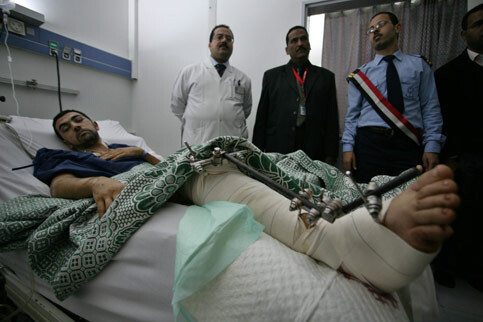The Electronic Intifada 31 December 2008

A Palestinian injured by an Israeli air strike on the Gaza Strip is treated at the Nasser Hospital in Cairo, Egypt, 30 December 2008. (Wissam Nassar/MaanImages)
CAIRO (IPS) - Formally, the Israeli-Palestinian “peace process” appears set to continue, in line with the last United Nations Security Council (UNSC) resolution. But the chances of finding a resolution are virtually nil in light of Israel’s new campaign against the Gaza Strip.
“Even before Israel’s latest bombardment of Gaza, the so-called peace process was dead,” Magdi Hussein, secretary-general of Egypt’s Islamist-leaning Labor Party (officially frozen since 2000), told IPS.
On Saturday, 27 December, Israel began a series of punishing air strikes throughout the Israeli-occupied Gaza Strip, whose interior is controlled by Hamas. According to Israeli officials, the campaign comes in retaliation for rockets fired at Israel by Palestinian resistance factions.
On Monday, 29 December, Palestinian Authority (PA) leader Ahmed Qureia announced the suspension of negotiations with Israel.
“It’s impossible to hold peace negotiations with Israel while its army is committing massacres against our people in the Gaza Strip,” Qureia was quoted as saying. “US-sponsored talks with Israel are now suspended due to the bloody scene that the Gaza Strip is witnessing.”
The current round of negotiations began in November 2007 with a peace summit in Annapolis, Maryland, where US President George W. Bush voiced his hope that a just settlement of the conflict could be reached before the end of his final year in office. The Annapolis summit was followed by a series of negotiations between Israeli Prime Minister Ehud Olmert and PA President Mahmoud Abbas. The PA has a limited mandate in the Israeli-occupied West Bank.
Up until this point, however, Abbas’ frequent talks with his Israeli counterpart have failed to bring any gains to the Palestinian side, with Israel continuing to reject key Palestinian demands. These demands — encapsulated in the 2002 Arab Peace Initiative — include an Israeli withdrawal to pre-1967 borders, the return of Palestinian refugees to what is now Israel, and the establishment of a Palestinian state with East Jerusalem as its capital.
Abbas’ negotiations with Olmert have also failed to significantly reduce the number of Israeli military roadblocks riddling the Palestinian West Bank, or stop the continuous construction of Jewish-only “settlements” on occupied Arab land.
According to Hussein, the Annapolis summit and the ensuing round of negotiations — like other past US-backed peace initiatives — was never meant to produce results.
“These intermittent ‘peace’ projects like Annapolis amount to little more than public relations exercises — they have never achieved anything positive,” he said. “They are ploys used to deceive the Arab governments and people. They are intended to fail.”
Bush’s call for a Palestinian state before the end of 2008, Hussein added, “was never even remotely credible.”
Nevertheless, in mid-December, the 15-member United Nations Security Council adopted a resolution, backed by the US and Russia, calling for “an intensification of diplomatic efforts” aimed at reaching a viable settlement. The resolution — the council’s first on the issue in almost five years — urged both sides to “refrain from any steps that could undermine confidence or prejudice the outcome of negotiations.”
“Since the resolution doesn’t demand that either side make concessions, it’s hard to see how it will change the status quo,” Abdelaziz Shadi, political science professor and coordinator of Cairo University’s Israel Studies Program, told IPS.
“In any case,” said Hussein, “the recent criminal assault on the Gaza Strip proves that Israel will never respect the terms of any UNSC decision.”
The issue of holding talks with Israel, meanwhile, has split the Palestinian cause into two rival camps. While Abbas’ US-backed Fatah movement, which heads the PA, has maintained a strategy of negotiation with the self-proclaimed Jewish state, the Islamist resistance group Hamas — which won Palestinian legislative elections in 2006 — follows a strict policy of resistance against Israel.
Since Hamas wrested control of the Gaza Strip from the PA in a preemptive coup last year, the two factions have seen bitter rivalry, with intermittent fighting and mass arrests. Meanwhile, Israel and Egypt — with the blessings of the PA — have sealed their borders with the Hamas-run Gaza Strip, effectively isolating it from the rest of the world and bringing it to the brink of humanitarian disaster.
“There doesn’t appear to be any hope for reconciliation between Fatah and Hamas,” said Shadi. “While vainly negotiating with Israel, Abbas has refused to talk to Hamas, which he still resents for its seizure of Gaza last year.”
To make matters worse, 19 December saw the expiration of a fragile, six-month ceasefire agreement between Israel and resistance factions — chief among them Hamas — in the Gaza Strip.
Brokered by Egypt in mid-June, the truce called for the halt of Israeli military operations against targets in the Gaza Strip and the gradual reopening of Gaza’s borders. In return, resistance factions in the Hamas-run enclave were to refrain from launching cross-border rocket attacks on Israel.
Even before its official expiration, the ceasefire had been subject to frequent violations. These included a number of deadly Israeli military operations in Gaza and retaliatory rocket fire — which caused little or no damage — by Palestinian resistance groups.
According to Egyptian commentators, Israel bears most of the blame for the collapse of the ceasefire, particularly in light of its refusal to open its borders with the Gaza Strip to food and medical supplies, desperately needed by the strip’s roughly 1.5 million inhabitants.
“Along with staging numerous attacks in the Gaza Strip in violation of the ceasefire’s terms, Israel has continued with minor exceptions to keep Gaza’s borders tightly sealed,” said Hussein. “The Israelis were the only real beneficiaries of the ceasefire, which served to halt rocket attacks from Gaza for the most part while allowing Israel to maintain its siege of the territory.”
Making the future of the peace process even more tenuous is the fact that the government of Prime Minister Ehud Olmert led by the “centrist” Kadima Party, may soon be replaced by one led by the extremist Likud Party. According to Israeli opinion polls, Likud leader Benjamin Netanyahu — known for his opposition to negotiations — is tipped to win upcoming Israeli elections in February.
According to Shadi, though, whatever political party heads the next government in Israel — be it Labor, Kadima or Likud — the Palestinian negotiations track is sure to suffer. “No matter who wins elections in Israel, they can be counted on not to offer any concessions whatsoever to the Palestinians,” he said.
Shadi went on to note that Israel’s latest assaults on the Gaza Strip must be seen within the context of Israeli domestic electoral politics.
“The electoral period in Israel — when candidates try to prove their military credentials — is always an occasion for escalations against the Palestinians, not for taking moderate positions vis-a-vis the peace process,” he said. “In the days and weeks ahead, Israel can be expected to take further military steps against the resistance.”
All rights reserved, IPS - Inter Press Service (2008). Total or partial publication, retransmission or sale forbidden.
Related Links


